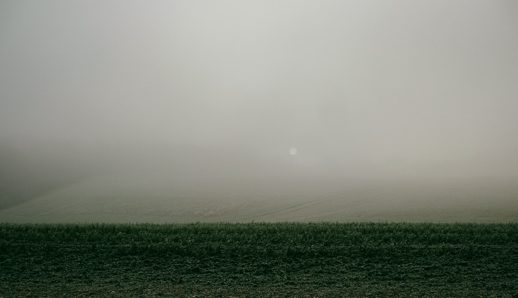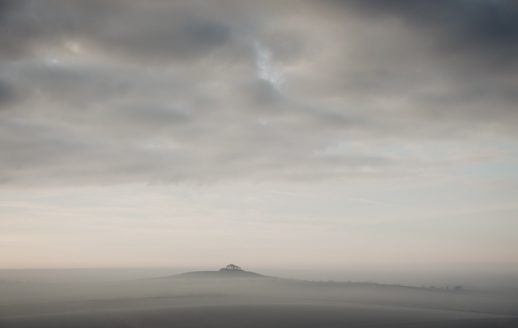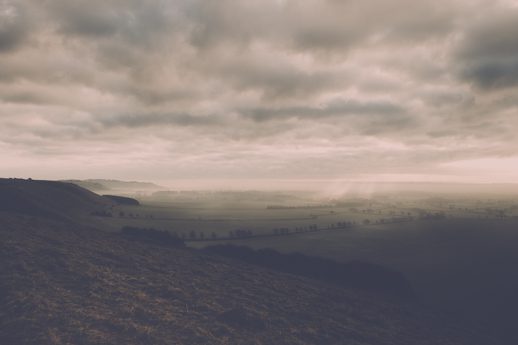Words and pictures: Malcolm Anderson
Monday morning sees me having to work from Avebury for the day. Not a bad office as places go, and it gives me an opportunity for an early morning walk up on the chalk ridge above Pewsey Vale.
I leave the house in the dark, listening for a short while to the news on Radio 4. There is so much crap out there right now that I have to admit to not being able to shake a certain general unease about the wider world. I’m constantly distracted by things that I don’t feel I have the power to change.
Gripping the steering wheel like it’s Donald Trump’s neck, I work my way gingerly through thick, freezing fog up the river valley. My shoulders ache and I’m not sure if it’s tension from a world gone wrong, or from concentrating so hard on the drive. I turn the news off, take a deep breath, switch on some J Mascis and try to calm down.
I pass over the canal and the bright nebulous lights of the timber yard appear. A lorry sits idling, nose-in, to the gate, its exhaust billowing sooty cumulus clouds in the gelid greyness. The road narrows and wiggles as it passes up past the Alton Barnes white horse, and the fog clears as I near the top.
Emerging into the pale, duck egg blue light of a winter’s morning, I park the car just over the rise of the hill and set out on foot across the sheep-grazed grass, up onto the bare back of the chalk escarpment.
That unease is back, distracting me from the walk. I can’t understand why so few people seem to be angry. Why are so few people shouting and screaming into the night about the privatisation of the NHS, pillaging of state school budgets or libraries and museums closing? Why do so few people do anything other than sign a couple of Facebook petitions and then go back to bed?
As I crest the top of the hill the world stops, just for a second. In front of me is an ocean of slowly shifting fog that stretches across the vale as far as I can see, and suddenly I’m looking out of an aircraft window onto the clouds from 30,000 feet. For this single, stolen moment, there is no corporate takeover of American government, no dissolving of the Paris climate agreement, no oil executives in charge of the Environmental Protection Agency. No uncertainty over what a post common agriculture policy British countryside will look like.
For now, the world is as it should be.
The fog shifts and islands appear; time-weathered hilltops with crowns of bare-branched trees silhouetted inky-black against the pale sky. As the fog retreats and the landscape opens up further, I find myself feeling distracted once more.
What does it take to make people rise up and fight?
What becomes worth fighting for? I mean, really fighting for?
It’s easy to forget that these lands in front of me, the lands where I walk, work and live, are revolutionary lands.
In 1655 at Clarendon Park, from the very grounds that I now call home, a large group of royalist insurgents set out to make a stand against the parliamentarians, attempting to rally support for Charles II who was in exile in Europe. After working their way south and west from Salisbury, the rebels were defeated by Cromwell’s troops at South Molton and many were imprisoned, including the father of Henry “Orator” Hunt.
Hunt was born in West Chisenbury in 1773, just across the river valley from the manor house where Penruddock had planned his doomed rebellion 118 years earlier. As a youth, Henry was a rake and a troublemaker. He was imprisoned on two occasions, making friends with radical thinkers Waddington and Clifford, and the political journalist and agitator William Cobbett. He became increasingly politically active and a self-proclaimed voice of the poor, and his skills as a mob-orator became infamous. He ended up presiding over the hustings at St Peter’s Field in Manchester, the site of the worst case of police brutality in British history, which became known as the Peterloo Massacre. His oratory wasn’t just needed in the industrial north however; the rural south needed his fire too.
Greedy landowners removed the poor’s access to common land to forage for food and to graze animals, in the name of improvement and profit. The powerful Tory Party ensured that profit was maximised for the wealthy, introducing protectionist laws against perceived foreign threats, thereby raising the cost of basic foodstuffs at the same time that the poor were losing the ability to feed themselves.
Cobbett, riding through Wiltshire in the 1820’s, was horrified by the living conditions of the agricultural workers he saw:
The labourers seem miserably poor. Their dwellings are little better than pig-beds, and their looks indicate that their food is not nearly equal to that of a pig. Their wretched hovels are stuck upon little bits of ground on the roadside, where the space has been wider than the road demanded. In many places they have not two rods to a hovel. It seems as if they have been swept off the fields by a hurricane, and had been dropped and found shelter under the banks on the roadside! Yesterday morning was a sharp frost; and this had set the poor creatures to digging up their little plates of potatoes. In my whole life I never saw human wretchedness equal to this.
Ultimately the countryside revolted, and in 1830 violence spread through agricultural communities across Kent, Sussex, Hampshire, Dorset, Wiltshire, Berkshire, Surrey and Buckinghamshire; the so-called ‘swing riots’. Initially violence was targeted towards the threshing machines, but developed into extorting the money that was owed by mills and landowners. The letters of threat and extortion were signed by the mythical figure of ‘Captain Swing’. Hunt was wrongly accused by his political opponents of being Captain Swing, and therefore the figurehead of the trouble.
After the unrest of the swing riots was crushed, around 2,000 people were tried, with 252 sentenced to death (only 19 actually hanged), 481 sentenced to transportation and 644 imprisoned.
The riots had a significant effect on the political landscape of the 1830s, but although landowners initially put up wages and lowered rents in the face of the violence and public outcry, this was only a temporary reprieve.
By 1834 the countryside of the south of England would once again become centre stage on the national political landscape. George Loveless and five other farm workers from the small village of Tollpuddle, some 50 miles away to the southwest in Dorset, formed a trade union and were duly arrested for having taken a secret oath, and sentenced to deportation. 800,000 people signed a petition against their arrest, and their supporters took part in the first successful protest march in the UK. The pressure on Government to pardon the men from Tolpuddle grew, until in 1836 the men were granted a full and free pardon and returned to England.
The landscape in front of me is quiet today, but once, not that long ago, it was overflowing with righteous anger. Yet nowadays it appears there is only apathy and complacency.
Mulling over history reminds me that we are not hopeless; we are not powerless. People can change things. With national and global political events seeming too big for any one individual to have any effect, it is worth remembering that there are billions of us, and if we all do something little, it can add up to something pretty big.
I stand, turn my back on the view and muss Mungo’s hair as he looks at me expectantly, waiting for the walk back. Work beckons, and I’m feeling energised about making a difference in my own small way.
As I walk back down towards the beckoning day, I recall the words from the union hymn that George Loveless scribbled part of after being sentenced:
God is our guide! from field, from wave,
From plough, from anvil, and from loom;
We come, our country’s rights to save,
And speak a tyrant faction’s doom:
We raise the watch-word liberty;
We will, we will, we will be free!
*
Malcolm Anderson on Caught by the River/on Twitter


